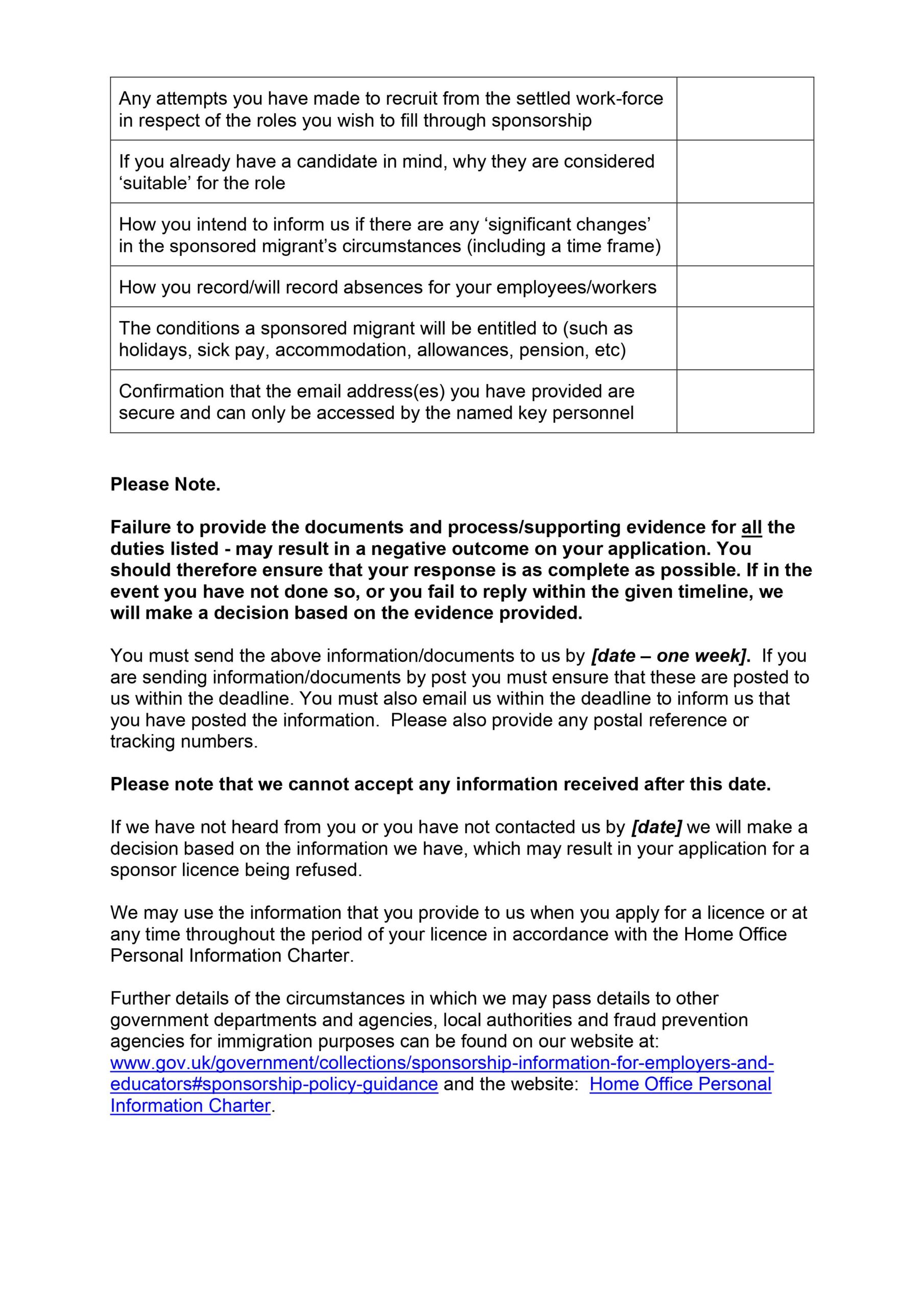Introduction
Whether you have a sponsor licence or are considering getting one, complying with your sponsor licence duties is important. If you don’t, you risk losing your licence and having any sponsored employees’ contracts terminated.
You might be struggling to work out what you need to do to comply with your duties, which is understandable. The Home Office has many rules, but they don’t specify how to create a system that abides by them. This is where this guide should help.
Who This Guide is For
This guide is for organisations struggling to make sense of what’s required, who don’t have the time to study five long policy documents, yet still want effective systems to stay on the right side of the Home Office. This could be for organisations who are about to apply for a licence, or who already have a licence. If you want to do your own reading, the basic principles of sponsorship are set out here and here. If you are applying for a Skilled Worker licence, then this is also essential reading.
This guide addresses the main issues to be aware of so that you can implement an effective and compliant system. It does not cover all of the niche issues set out in the Home Office guidance. For example, we’re steering clear of areas such as changes in ownership or what the Home Office call ‘behaviour not conducive to the public good’ (discriminatory practices, terrorism, fostering hatred etc).
Written by practitioners who have helped countless clients in this area, this guide should be easy to understand. Where something is complex, we will give you a full explanation so that you can make sense of it.
As ever, our approach in our legal guides is to fully offload our years of wisdom for free. If you would like advice that is specifically tailored to your situation, you can also book a consultation with us.
Principles of Sponsor Licence Compliance
We will explore what sponsor licence compliance means in more detail, below. But first, it’s worth understanding why the Home Office sees sponsor licence compliance as such a crucial area.
The below extract is from the Home Office’s guidance for sponsors, which demonstrates their view on sponsor licence holders:
As a sponsor, you are effectively responsible for ‘keeping tabs’ on any individual you sponsor. In a sense, you become an extension of the Home Office.
As we’ll see below, in certain situations you may need to report the sponsored worker to the Home Office. The Home Office want to know that you have systems in place so that you can adequately carry out this supervisory role.
Hopefully, you are already doing much of what needs to be done. Some of what is required may seem strange and irrelevant to you, especially if you are a small business. But whether you fully buy into what’s required with heart and soul or see this as a strange game to be played (we sympathise!), either way you need to get on the right side of the Home Office.
Why is Sponsor Licence Compliance Important?
Types of Inspection
The Home Office test whether you can comply with your duties by inspecting your HR practices. They do this by carrying out a sponsor licence compliance check on your business.
On-site Inspections
An on-site inspection is where at least one Home Office official turns up and questions any key personnel and sponsored workers. Expect an intensive grilling which lasts many hours. On-site inspections can be ‘announced’, meaning you would typically get a few weeks’ advance warning, or ‘unannounced’, meaning no notice at all. In our experience, unannounced visits are uncommon. We believe these would only happen in cases where the Home Office has intelligence that something seriously fishy is going on.
Digital Compliance Inspections
Much more common, especially since January 2022, are digital compliance inspections. In our experience, these often happen as part of the consideration of the sponsor licence application. Typically, around eight weeks after submitting an application, the Home Office will send businesses a letter by email. The letter requests detailed information about the organisation’s HR systems and how it can comply with its sponsor licence duties.
Here is a redacted version of the letter which is commonly sent out:
Different Types of Sanctions
Refusal
If you are at the application stage and are deemed to be non-compliant, your application will be refused. If your application is refused, then you are further punished with a patronisingly named ‘cooling-off period’ – during which you cannot re-apply for a licence. Generally, the minimum cooling-off period will be six months, with longer time-outs for more serious breaches.
If you already hold a licence but are found to be in breach of your duties, then the sanctions can be particularly devastating. For example, your licence could be suspended pending further investigation by the Home Office. Whilst suspended, you cannot assign new certificates, meaning you cannot sponsor new workers. Your licence may also be ‘downgraded’ from A-rating to B-rating, resulting in a loss of various privileges. If downgraded, you must comply with a time-limited ‘action plan’, to regain an A-rating.
Revocation
The most severe, but unfortunately not uncommon sanction, is sponsor licence revocation. Licence revocation takes effect instantly, meaning you would immediately lose your licence and have to terminate the employment of any sponsored workers. Those sponsored workers would then generally have their permission to stay (visas) curtailed (cut short) to 60 days from the date they receive their curtailment notice.
The effects of non-compliance can be devastating, causing serious business disruption and serious disruption to the lives of the individuals being sponsored, who will more often than not be forced to leave the UK at short notice.
How to Be Compliant – Key Areas
In this section we will help you to answer the burning question, ‘How can I comply with my sponsor duties?’. As already highlighted above, the Home Office lays down principles. It’s then up to you to devise a suitable system to comply with them. We will now look at key areas to address, and the type of system you will need.
Carry Out Proper Right to Work Checks
If you don’t have a sponsor licence, right to work checks are essentially optional – you can to some extent take your chances. If you forgo a right to work check and an individual has a legal immigration status, you will not face a sanction. However, if it turns out that the individual has no legal immigration status, you face a fine of up to £20,000.
This position, however, changes when you have a sponsor licence. Right to work checks become mandatory for a licence holder and failure to carry out proper checks can lead to harsh sanctions. To be clear, even if an individual has a lawful entitlement to work for you, if you fail to carry out a correct right to work check you could risk penalties including licence revocation.
There are various Home Office guides if you are not sure how to carry out a proper right to work check, see here and here. Rather than going through this at length, it’s worth highlighting a few common pitfalls:
- Carry Out the Right to Work Check Before the Employee Starts
For a right to work check to be effective, you must carry out the right to work check before the individual commences employment for you. - Know Which Right to Work Check You Need
- Online Right to Work Checks
As of 1st July 2021, you must conduct an online right to work check on any individual registered under the EU Settlement Scheme.
In addition, it was recently announced in April 2022 that you must also carry out an online right to work check if an individual holds a biometric residence permit or biometric residence card.
You can carry out an online check here.
Manual Right to Work Checks
Individuals with other types of status, including British nationals, will generally require an old-fashioned, manual right to work check. You can either carry this out yourself, or you can use an Identity Service Provider (IDSP) to carry out the check in respect of any British and Irish citizens.
Maintain a Secure Record of the Date of the Check
When carrying out a manual right to work check, it is not enough to simply take a photocopy of an ID document. You must also retain a secure record of the date on which you made the check.
However, you cannot just write the date on a photocopy of a document. You must include other details such as who undertook the check. For example, you could write: ‘I certify that a right to work check was undertaken on [date]’ and write your name and signature next to it.
Diarise Any Right to Work Expiry
If your employee is British or holds indefinite leave to remain, then a single right to work check before they start is sufficient for the duration of their employment. If the individual is on any kind of time-limited permission to stay, however, then you will need to do a follow-up right to work check.
One common type of time-limited permission to stay is where an individual holds Pre-Settled Status under the EU Settlement Scheme. Pre-Settled Status is a five-year grant of permission. Alternatively, an individual might present to you a time-limited biometric residence permit, showing an expiry date.
It is important to understand that, in respect of time-limited permission to stay, your right to work check will only cover the duration of the grant of permission. It is therefore essential that you plan to do a follow-up right to work check.
We would recommend that you have two entries in your calendar for an individual on time-limited permission: an entry for the expiry date of the permission; and a reminder three months prior to the expiration date.
Any Home Office official will always want to know that you have an effective system in place for monitoring visa expiry dates. Even if you don’t currently have any individuals on a time-limited visa, you must still be able to show that you have an effective system in place to be able to cater for them.
Advertising and Recruitment Process
Thankfully, there is no longer a requirement to hold a formal recruitment exercise in respect of positions you wish to sponsor, formerly known as the ‘resident labour market test’. However, there is still a requirement that any vacancy to be sponsored must be ‘genuine’.
In assessing whether a vacancy is genuine, the Home Office will consider whether there are reasonable grounds to believe that the vacancy does not exist, is a sham, and/or has been created mainly so that the worker can apply for a visa.
To prove that a vacancy is genuine, we normally advise that you provide evidence of advertising for the role(s) to be sponsored. However, if the individual has previously worked for you, then there is effectively an exemption from having to advertise.
Be aware that if you do advertise, you must retain evidence of the advertisement, such as a screenshot. You must also keep a record of ‘the number of people who applied for the job, and the number of people shortlisted for interview or for other stages of the recruitment process’. You will also need to retain some additional evidence of the selection process. Options include a list of common interview questions or brief notes on why the successful candidate was selected and others were not. A full list of options is here.
Recording of Contact Details
As a licence-holder, you will carry out a supervisory function and where necessary report your sponsored worker to the Home Office if they break certain rules. For example, you must report your sponsored worker to the Home Office if they are absent without leave for more than 10 consecutive working days.
When inspected, the Home Office will want to know that you have contact details for the sponsored worker. You must be recording their residential address, personal email address and telephone number (mobile and/or landline).
As mentioned in Appendix D, contact details must ‘always be kept up to date’. You will therefore need a system in place to check your sponsored workers’ contact details. We recommend that you do this by putting a reminder in place to send an email out to check employees contact details at least every four months.
Another requirement is that you retain a history of sponsored workers’ contact details. The idea is, presumably, that if the worker ‘does a runner’, you will have both up to date contact details, and a historical record, to present to the Home Office so they can make investigations. You will therefore need to ensure you have an appropriate way of recording historical details. If your HR system overwrites new contact details, this is unlikely to be compliant.
Other Record Keeping
The Home Office will also want to check that you have general HR practices in place. Firstly, you must have an effective system for recording absences and other types of leave. You should also have well-organised personnel files and employment contracts for your staff.
For sponsored workers, they must receive payment into their bank account, and you must issue them with appropriate payslips. You cannot make payments in cash. The Home Office may also check that sponsored workers are being paid the salary stated on their certificate of sponsorship, so you must ensure that this is correct.
How Truth Legal Can Help
Truth Legal can help in many ways to help you stay on the right side of the Home Office. We quote competitively, and we will always be upfront and transparent about what we will charge and when. We offer a free, no-commitment, 20-minute consultation before starting anything. This means that you can get to know us, and we can learn more about your business. Below are some of the common services we provide in relation to sponsor licence compliance.
Pre-licence Compliance Report
We developed the ‘Pre-licence Compliance Report’, as we were growing tired of seeing organisations receive a ‘pre-licence compliance check’ as part of the application process. Those targeted in this manner had to urgently adapt their HR systems and piece together a suitable response. In addition, this check would add on months to the decision-making process.
Our Pre-licence Compliance Report involves a separate consultation with you to specifically comb through your HR systems. We then request appropriate evidence from you (in the form of screenshots, spreadsheets etc.) and compile a comprehensive report, addressing key compliance concerns. This report is sent at the application stage. This should reduce the chances of being inspected and, if you are, you already have a report to hand over.
Consultations
Often, a detailed consultation with one of our experts is sufficient to get you on the right track. We will discuss the specifics of how to implement an effective HR system. It is then over to you to implement our recommendations.
Mock Audits
We also offer a variety of mock-audits of your HR system to assess your compliance in practice. These can be conducted either on-site or remotely. We would normally carry out an audit on a random selection of files. We would then provide detailed compliance feedback on compliant areas and areas to improve.
More Legal Guides
Comprehensive and free legal guides from Truth Legal Solicitors.
















